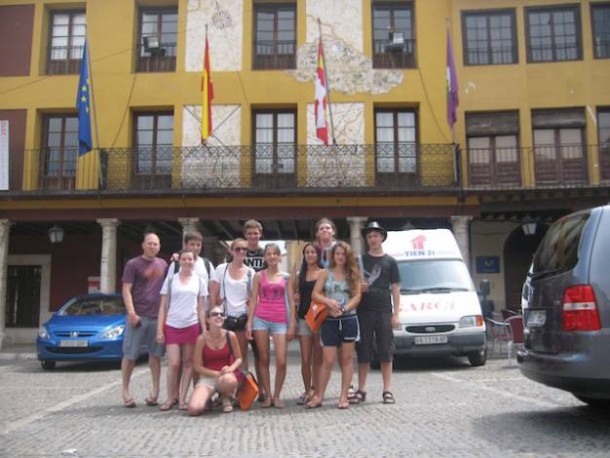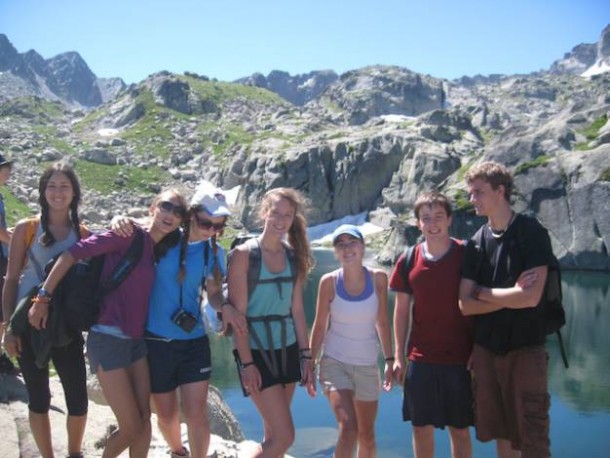SPAIN. In this interview, Jordan Romm shares his experiences about leading study abroad tours in Spain and creating his own study abroad company, LITA (Language Immersion Trips Abroad).

Study abroad tours in Spain
Could you tell us a little about your educational background? What got you interested in leading student trips to Spain?
Jordan Romm: When I was 16, I participated in an exchange program that placed me with a family in a rural town in Castilla. It was really a foundational experience for me. It was funny because a few weeks before that trip I remember being really nervous and telling my parents that I didn’t want to go. I had never really traveled on my own before, and the thought of spending five weeks in Spain was kind of daunting. It’s not that I didn’t want to go, but I was really anxious. All kinds of normal but nervous thoughts were going through my mind. What if I didn’t get along with my homestay family? What if I was really homesick? What would I do if I couldn’t communicate with them? I came to realize that those were really normal concerns, but of course, I decided to go through with it. It turned out to be one of moments that I look back on now and I can honestly say determined the course of the rest of my life. I had an incredible experience. I connected in authentic ways with my homestay family and fell in love with the community where I was placed. As a result of that trip, I decided to pursue languages at Middlebury College and after graduating went to work for a company in Boston that placed foreign students with families here in the U.S. Professionally, it was not that positive of an experience, but I did meet my future wife while working there. So, now that I look back on that experience when I was 16, it really did affect everything that I would do from then on, both professionally and personally. It’s amazing to think about that. I realize that not everyone who participates in some sort of cultural immersion experience is going to have such a transformative experience, but for me, it certainly was that. Much of what I have in my life right now, my family, my friends, the community in which I live in Vermont, and the professional path that I have chosen can all be attributed in some way to that decision to participate in a homestay in Spain. I think about how close I was to not doing it, and I am amazed at how different my life would be right now. So I suppose my advice to younger students is to recognize the vast potential and growth that can come from these types of experiences and to just take the plunge and do it. Being uncomfortable is part of the whole experience.
Most recently, you have established your own business. What services will you be offering exactly?
After teaching Spanish for 9 years in a few different high schools in New England, last year (summer of 2010) I took a group of 9 students from the school where I was teaching to Spain. I designed the whole itinerary myself because I knew exactly the type of experience that I wanted to provide for the students. I had done several other trips to Spain with high school students in the past, but they were mostly 10 day touring trips in which we would go to Madrid, Barcelona, a few other places of interest. They weren’t really language immersion trips, but more just cultural experiences. I am still in touch with some of the students who participated on those trips and they all talk about how great of an experience it was, but I knew that for last summer’s trip, I had the potential to truly design a trip that focused around a lengthy homestay and was more of a language immersion experience. The trip wound up being a huge success in every way, from the planning of it to the actual trip itself. While I was in Spain with the students, I had what I guess can best be described as “a professional moment of clarity.” I’ve loved working with high school students and I love the great energy that they bring to everything they do, but I also love Spain. It’s become a second home for me, a place that I’ve spend more than four years of my life living in since I first had that experience when I was 16. So seeing both of those components come together during the trip was really profound, as much for me as it was for the students. When I returned to the States in August of last year, I had a clear vision of the direction that I wanted to take my life professionally. I’ve spent the last 6-8 months writing a business plan, putting together another trip for this coming summer, and working on website and creative development for the business. It’s been a really rewarding process.

Study abroad tours in Spain
My company’s name is LITA (Language Immersion Trips Abroad), which at first was a name that I kind of stumbled upon. It was more of an acronym for the type of services I would provide. My daughter is 3 years old and her name is Ayla. I speak only Spanish to her, so eventually, I started calling her Aylita and then just Lita. So the name LITA had some personal significance for me, but at first, I wasn’t sold on the name. I needed to register the business as a legal entity in the state of Vermont, where I live, so I needed to make a decision quickly about the name. It’s funny though, because the more that I’ve sat with the name and told people about it, the more I’ve come to love the name. Something that ends in “ita” in Spanish usually signifies something small, personal, and something about which you care a great deal. In many ways that is the mission of the business; to provide students with a small group experience, tailored to their personal hopes and needs, and done in a really personal way. It’s a small business, something that comes from a true passion of mine, so in that way, I think the name really works.
Initially, there are two specific models for trips that I will be offering, and both focus around carefully selected homestay experiences and adventures off the beaten path in Spain. The first type of trip is an open enrollment trip in which any students from any high school can enroll. When the website and business officially launch in the fall of 2011, I will be spending a lot of time on the road meeting with Spanish teachers in person, visiting classes and meeting students, and speaking directly with administrators at different schools in hopes that they will support my programs as a great option for students seeking a true immersion experience in a small group setting. These trips are open to students from any school and the groups will be comprised of students who likely do not know each other. We’ll spend a lot of time focusing on group dynamics and building a team of students who can truly function in ways that support one another as we travel together throughout Spain.
The second model for trips that I will be offering is to work directly with a specific school to provide them with the type of immersion experience that they are seeking for their students. The model for the trip will be basically the same in that it will focus around a homestay for the individual students, but working with a specific institution will allow me to develop the type of trip that is in line with the schools mission, be it service oriented, more academically oriented or more adventure oriented. The possibilities for this are infinite. The students will likely know each other previously so the dynamics will be different for these types of trips. The leaders on this type of trip will likely be teachers from that particular school, so although I would be present and traveling with the group, I will be more a coordinator of activities and logistics.
Both of these trips will focus on having students arrive at an understanding of the diverse cultural and linguistic nature of Spain. Most people in the U.S. have a fairly stereotypical understanding of Spain and do not realize that Spain is really made up of regions with vast cultural differences that do not conform to what they have come to believe. For example, traveling and experiencing Galicia is so different than spending time in the Pyrenees or in Barcelona. In some ways, they may as well be different countries.
What would you say is the biggest challenge of leading student trips in Spain?
One of the biggest challenges that I see is motivating students to truly make the most of their homestay experience. Some students are naturally inquisitive and never stop asking questions, which is great. That is really the approach that you need to take. I believe that the more students buy犀利士
into the homestay the more they will grow from the experience. It’s very difficult to see a student who is more naturally introverted become more closed-off or more timid during their homestay. Host families sometimes misinterpret their shyness as being disinterested and it can often take a few weeks before they learn each other’s strengths and how to best communicate. With some of the summer programs, after two weeks, the homestay is often close to being finished and students will have missed the window of opportunity to create authentic relationships. I’ve seen this happen several times with students of mine. I will know them as outgoing and very social in a setting in which they are comfortable but when they arrive at their homestay they shut down and become more aloof. My best advice is to prepare yourself before you travel to be as outgoing as possible. Offer to help out with even the simplest tasks and see everything as a learning opportunity.
You also regularly recruit co-leaders for trips. If graduate students are interested in leading trips in the future, what skills should they be working on?
I will certainly be regularly recruiting co-leaders. One of the things that I look for the most is the ability to connect teenagers. LITA groups are small and personal and co-leaders need to be fun and dynamic with an ability to connect with the students in their groups. Also, being responsible for 10 or more teenagers traveling in a foreign country is a large task, so attention to detail and safety are, of course, a must.
Lastly, what advice can you give to students, high school or college, coming to study Spanish here in Spain? How can they make the best of their experience?
I tell students that living abroad should be at worst a really fun time and at best a life-changing experience. As I mentioned earlier, I think the greatest growth comes from approaching the experience with a sense of curiosity and wonderment. Seeing everything as a learning opportunity is so important. Never stop asking questions of your group leaders, teachers, and host family members. If students approach their time abroad as an academic experience and do everything they can to learn the language they will leave with an experience that will certainly inform the rest of their lives. I have seen students from the States come to Spain and spend most of their times in bars with other Americans. As much as I understand how comfortable that can be, it seems like a missed opportunity.

